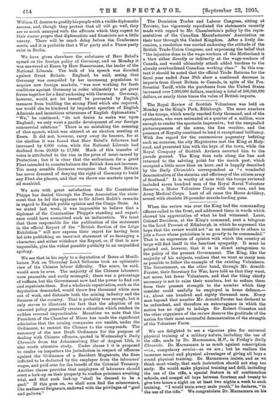When the review was over the King had the commanding
officers called to the front, and addressed them in words which showed his appreciation of what he had witnessed. Later, Colonel Davidson, at the King's command, sent a telegram to the Lord Provost of Edinburgh in which he expressed the hope that the review would act "as an incentive to others to join a force whose patriotism is so greatly to be commended." That is an expression of opinion with which the country at large will find itself in the heartiest sympathy. It must be pointed out, however, that it is in direct antagonism to the policy of the present Government. The King, like the majority of his subjects, realises that we want as many men as possible to follow the example of the existing Volunteers. The Government, on the other hand, through Mr. Arnold- Forster, their Secretary for War, have told us that they want, not more, but fewer Volunteers, and that the thing chiefly necessary is not to raise their numbers, but to reduce them from their present strength to the number which they consider could usefully be employed in home defence,— i.e., about one hundred• and eighty thousand men. Every man beyond that number Mr. Arnold-Forster has declared to be redundant, and therefore an extravagance in which the nation has no right to indulge. Sir Robert Cranston and the other organisers of the review deserve the gratitude of the nation for their most successful demonstration of the strength of the Volunteer Force.










































 Previous page
Previous page